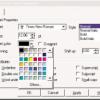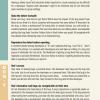Process
Better Software Magazine Articles
 |
Deconstructing GUI Test Automation Window mapping gives elements specific names so tests are easier to update and understand. Task libraries group sequences of steps that make up part of user tasks when those sequences show up in multiple tests. Data-driven test automation separates the parameters of a test case from the test script so that the test script can be reused for many related tasks. Keyword-driven test automation formats tests as tables or spreadsheets and creates parsers to read and execute the test descriptions. Take advantage of these four techniques to help you test a graphical user interface, and see how developers can make your life easier. |
|
|
Surviving the Witch Hunt A witch hunt is the search for whoever let those darned bugs out into the field. How do you stop a witch hunt? The best way is to refocus attention from "someone to blame" to "something to fix." If you focus on what in the process is causing the defects and discuss how to minimize or even eliminate the causes, you have a real chance to turn things around. |
||
|
A Look at TeamTrack by TeamShare David Lee's company needed a system to track customer support and development issues—one that had the right combination of tools and the scalability they needed to effectively address their customer needs, as well as their own internal requirements. Here is a discussion of why they chose Team Track, and an evaluation of the tool. |
David S. Lee
October 18, 2002 |
|
 |
Delivering Unwelcome News to Developers How well you present a defect to a developer can impact when a defect is resolved–or whether it is resolved at all. Deliver the information abruptly or inappropriately, and you run the risk of alienating a person or creating project hot spots that aren't needed. Deliver news too passively, and your report may be discarded. Karen Johnson describes some ways to soften the blow so that your defects are not only acknowledged, but fixed. |
|
 |
A Measured Response An infinite number of metrics can be applied to various aspects of software development. In fifteen years of managing software development, Mike Cohn has found a handful of metrics that really help him do his job--and keep him cool and confident when the heat is on. Here, he describes product stabilization metrics, programmer quality metrics, customer satisfaction metrics, and complexity metrics. |
|
|
Adopting XP Extreme Programming (XP) takes practices that are known to be good and combines and applies them in a revolutionary way. Before you turn your team on to XP, check out the steps to take, and pitfalls to avoid, to make your project an "Xtreme" success. |
C. Keith Ray
August 1, 2002 |
|
|
Why Nobody in Our Business Can Estimate Tim Lister gives three examples of software project failures that resulted from poor estimates. The main problem? Software practitioners often don't understand the difference between an estimate and a goal. Here is some advice on how to be better estimators. |
||
|
|
Forecasting Software Defects The six weeks of testing you've been preparing for are suddenly reduced to one, but you still want to provide some assessment of overall quality. Read about this statistical approach to predicting the number of failed test cases in an application. |
|
|
Bug Tracking Basics Effective bug tracking assures that bugs are logged, fixed, and verified by the appropriate personnel. Here's a beginner's guide to this process. |
Mitch Allen
July 30, 2002 |
|
|
Tinkerable Software In what ways should software be like a house? In a recent issue of STQE magazine, Technical Editor Brian Marick’s musings about the concept of “tinkerable software” generated some interesting discussion about the very nature of software design. This week’s column runs a portion of that piece so that our Sticky-minded readers can sink their thoughts into the concept. |
Brian Marick
July 30, 2002 |








